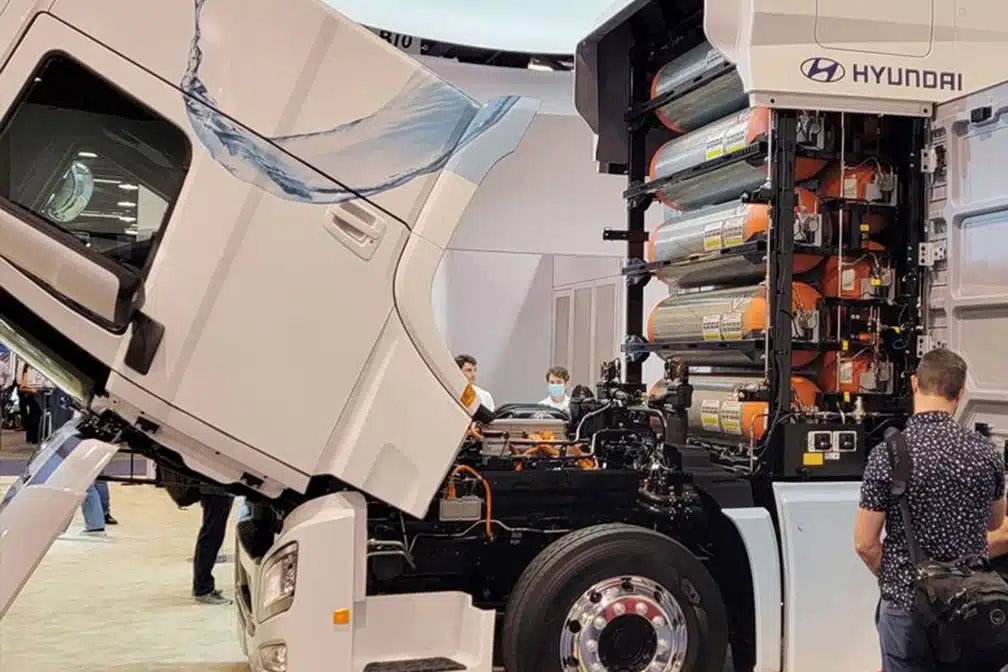The Industry and Hyundai XCIENT: Class 8 Truck Updates
Class 8 truck orders in North America experienced a decline in April compared to March. However, industry experts remain optimistic about future demand, citing factors such as pent-up demand, aging fleets, and ongoing requests for equipment from fleets.

Current State of the Class 8 Trucking Industry
1.1 Market Trends and Demand
The Class 8 trucking industry is crucial for the economy, transporting goods over long distances. Recently, there have been ups and downs in demand. Reports show that Class 8 truck orders in North America dropped in April compared to March. Despite this, experts are hopeful about future demand, pointing to factors like pent-up demand, aging fleets, and ongoing equipment requests from fleets.
1.2 Technological Advancements
The Class 8 truck, also known as an 18-wheeler, is changing as new fuels and technologies emerge. Electric trucks, powered by batteries, are becoming more popular as an alternative to diesel trucks. These electric trucks are better for the environment, quieter, and cheaper to run in the long term. Autonomous driving technology is also being tested and added to Class 8 trucks to improve safety and efficiency.
1.3 Infrastructure Development
Good infrastructure is key for new technologies in the Class 8 trucking industry. Expanding charging stations for electric trucks and hydrogen refueling stations for fuel-cell trucks is essential. Currently, there are few charging and refueling stations, especially for hydrogen fuel-cell trucks. Support from the government and investments from the private sector are needed to build a comprehensive network.
1.4 Cost Considerations and Government Incentives
Costs are important when adopting new technologies in the Class 8 trucking industry. While electric and hydrogen fuel-cell trucks may cost more upfront than diesel trucks, the savings in fuel and maintenance can make up for it. Additionally, government incentives and subsidies can make these technologies more affordable in the long run.
The Hyundai XCIENT Fuel-Cell Truck: Harnessing the Power of Hydrogen
2.1 Design and Technology Integration
The Hyundai XCIENT FCEV is a Class 8 fuel-cell truck that uses hydrogen for clean and efficient operation. It has ten hydrogen tanks behind the cab, holding over 462 gallons of compressed hydrogen at over 10,000 psi. These tanks supply two hydrogen fuel-cell systems, producing 483 horsepower. The XCIENT combines traditional truck parts with advanced fuel-cell technology for a quick market introduction.
2.2 Battery Integration and Power Management
The XCIENT uses a high-voltage battery system with a 72.0 kWh capacity. This lithium-ion battery stores and sends power to the electric motors, which generate 469 horsepower and 1650 pound-feet of torque. An Allison six-speed automatic transmission manages power delivery to the drivetrain.
2.3 Range and Refueling
The Hyundai XCIENT can travel 450 miles on a full load of tanks and cargo, making it suitable for long-haul trips. Refueling the hydrogen tanks from empty takes about 30 minutes, allowing for a quick turnaround time for drivers. These features make the XCIENT comparable to diesel trucks while greatly reducing emissions and improving sustainability.
Advantages and Challenges of Hydrogen Fuel-Cell Trucks
3.1 Environmental Benefits
Hydrogen fuel-cell trucks, like the Hyundai XCIENT, have several environmental advantages over diesel trucks. Using hydrogen as fuel, these trucks produce zero greenhouse gas emissions, helping to fight climate change. They also eliminate noise pollution, providing a quieter driving experience for truckers and reducing noise in busy truck areas.
3.2 Infrastructure Development and Market Adoption
A major challenge for hydrogen fuel-cell trucks is developing a strong hydrogen refueling infrastructure. Currently, there are few hydrogen refueling stations, and they are located in specific regions. Expanding this infrastructure is essential for the widespread use of hydrogen fuel-cell trucks and enabling long-haul operations nationwide. Government support, private sector investment, and collaborations are needed to speed up the deployment of hydrogen refueling stations.
The Class 8 trucking industry is at an important point, adopting new technologies and fuels to improve efficiency and reduce environmental impact. The Hyundai XCIENT fuel-cell truck is a significant step forward in using hydrogen fuel-cell technology. With its impressive range, quick refueling time, and reduced emissions, the XCIENT shows the potential of hydrogen as a viable alternative to diesel trucks.
However, challenges like infrastructure development and market demand still need to be addressed for widespread adoption. The industry’s future will be shaped by technological advancements, infrastructure growth, and supportive government policies, leading to a greener and more resilient Class 8 trucking industry in the years to come.






